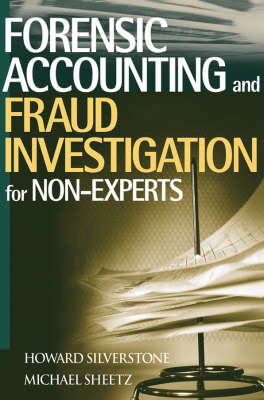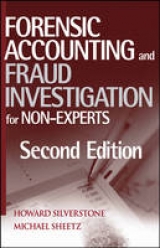
Forensic Accounting and Fraud Investigation for Non-experts
John Wiley & Sons Inc (Verlag)
978-0-471-46324-5 (ISBN)
- Titel erscheint in neuer Auflage
- Artikel merken
This is a thorough guide to forensic accounting and investigation for the non-expert. Here's a dependable, up-to-date resource for detecting, preventing, and successfully prosecuting financial fraud. The authors address all phases of forensic accounting, complete with actual examples demonstrating applications in the real world. In one conveniently organized volume, non-experts get access to all the critical accounting principles and investigative techniques that help protect any organization from fraud, including insightful advice on where an organization is most susceptible to fraud and how to implement effective investigation processes when fraud is suspected.
Howard Silverstone, CPA, FCA, CFE, is a principal in the Philadelphia office of Kroll, Inc. He has concentrated on forensic and investigative accounting since 1985 and has been involved in every aspect of cases, including planning, detailed analysis, discovery, and expert testimony in forensic accounting. He has contributed articles to The Legal Intelligencer, Litigation Quarterly, and The Risk Report, as well as a chapter to The CPA's Handbook of Fraud and Commercial Crime Prevention. A frequent speaker, he's delivered presentations for many corporations, law firms, and insurance companies, as well as The Association of Certified Fraud Examiners, The Institute of Internal Auditors, and the Association of Financial Professionals (formerly the Treasury Management Association). Michael Sheetz, JD, is an adjunct professor of business law, ethics, and international law for several universities, and a former appellate law clerk for the Fourth District Court of Appeals. During his twenty--year law enforcement career, he has been involved in every facet of criminal investigations of economic and computer crime, including fraud, Internet child pornography, embezzlement, money laundering, and racketeering. As a guest speaker and lecturer, he has spoken on topics such as exploitation of the elderly, computer crime and fraud prevention, and telemarketing fraud.
Introduction. Part One: Fraud and Forensic Accounting Overview. 1. Fraud in Society. What Is Fraud? Types of Fraud. What the Numbers Tell Us about Fraud. The Social Consequences of Economic Crime. Notes. Suggested Readings. 2. Understanding the Basics of Financial Accounting. Introduction. The Father of Accounting. The Five Accounting Cycles. Journals. Tying the Thread. Note. Suggested Readings. 3. The Entities. Introduction. Proprietorships. Partnerships. Corporations. Notes. Suggested Readings. 4. Fundamental Principles of Analysis. Good Analysis = Due Diligence? Why Do It? Analysis for the Non--Expert. Analysis through a Case Study. To the Future. Note. Suggested Readings. 5. The Role of the Accounting Professional. The Importance of Accounting Professionals in the Investigation. The Audit Process. Internal Controls. Notes. Suggested Reading. Part Two: Financial Crime Investigation. 6. Business as a Victim. Introduction. Employee Thefts. Payroll Fraud. Fraudulent Billing Schemes. Fraud Committed by Outsiders. Management Thefts. Corporate Thefts. Notes. Suggested Readings. 7. Business as a Vehicle. Introduction. Organized Crime and Business. The Lifecycle Model of Traditional Organized Crime. The Shared Profit Motive. Money Laundering. Cyber--Laundering. Summary. Notes. Suggested Readings. 8. Case Generation. Introduction 119 The Investigative Process The Investigation Life Cycle. Summary. Notes. Suggested Readings. 9. Interviewing Financially Sophisticated Witnesses. Introduction. The Interview Process. Bringing Closure to the Interview. Interviews in Financial Crime. Summary. Notes. Suggested Readings. 10. Analytical Techniques for Financial Crime Investigation. Introduction. Getting Organized. The Process of Proof. The Logic of Argument. The Inferential Nature of Proof. Summary. Notes. Suggested Readings. 11. Inference Network Analysis. Introduction. Linking Inferences. The Investigative Inference Model. Summary. Notes. Suggested Readings. 12. Implementing the Investigative Inference Model. Introduction. The Key List. Plotting the Chart. Some Tips for Plotting Success. Applying the Chart to the Investigative Process. Summary. Notes. Suggested Readings. 13. Documenting the Investigation. Introduction. The Casebook System. Components of the System. Closing the Book on the Casebook System. Notes. 14. Testifying in Financial Crime Cases. Introduction. The Role of the Professional Witness. Communicating Your Knowledge. The Role of the Financial Crime Expert in Litigation. Summary. Notes. Suggested Readings. Appendix A: Key List. Appendix B: Federal Rules Of Evidence. Glossary. Index.
| Erscheint lt. Verlag | 29.1.2004 |
|---|---|
| Zusatzinfo | Illustrations |
| Verlagsort | New York |
| Sprache | englisch |
| Maße | 161 x 238 mm |
| Gewicht | 539 g |
| Themenwelt | Recht / Steuern ► Strafrecht ► Kriminologie |
| Wirtschaft ► Betriebswirtschaft / Management ► Rechnungswesen / Bilanzen | |
| ISBN-10 | 0-471-46324-8 / 0471463248 |
| ISBN-13 | 978-0-471-46324-5 / 9780471463245 |
| Zustand | Neuware |
| Haben Sie eine Frage zum Produkt? |
aus dem Bereich



